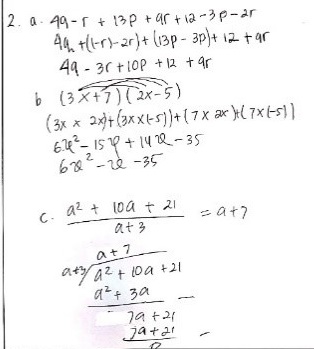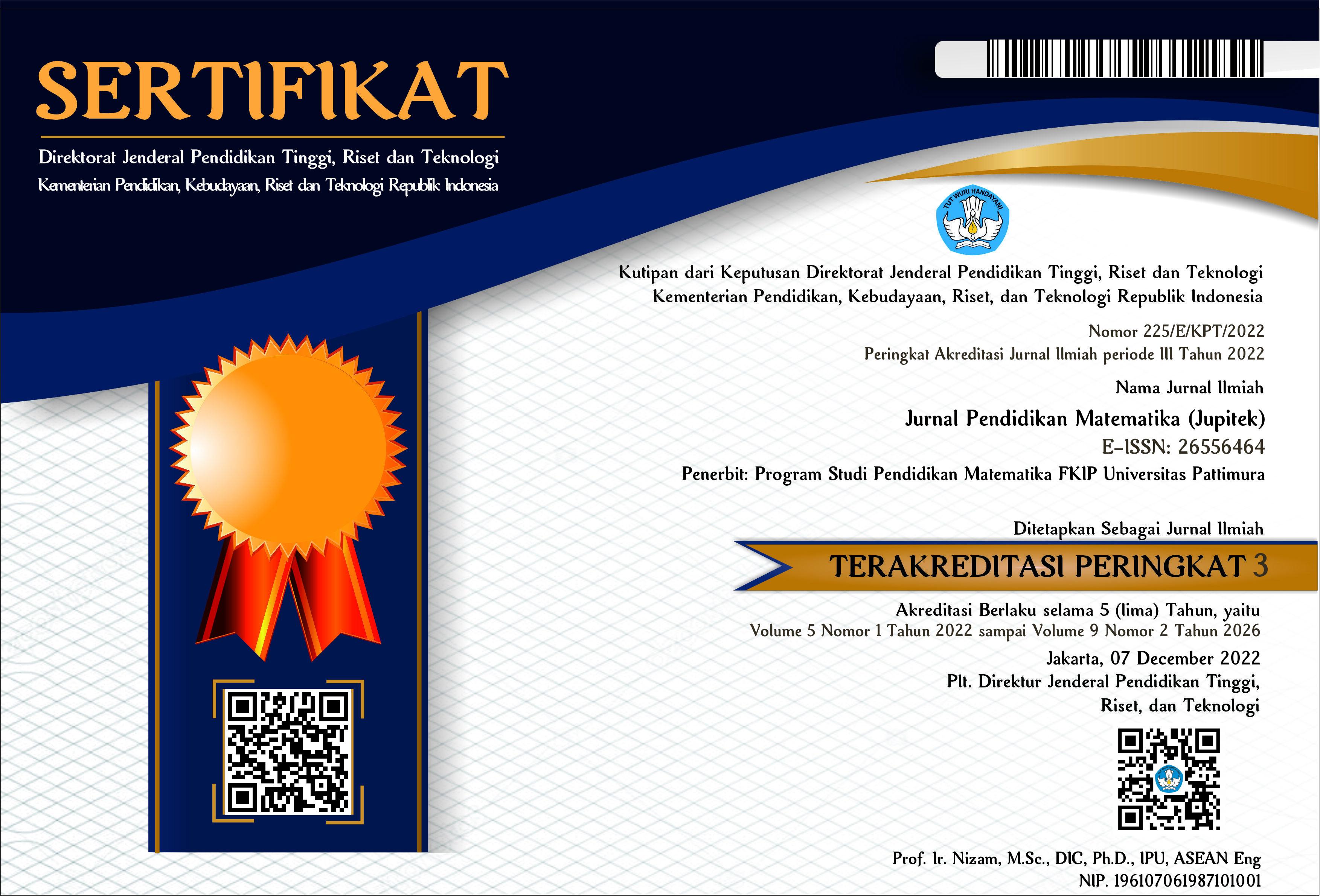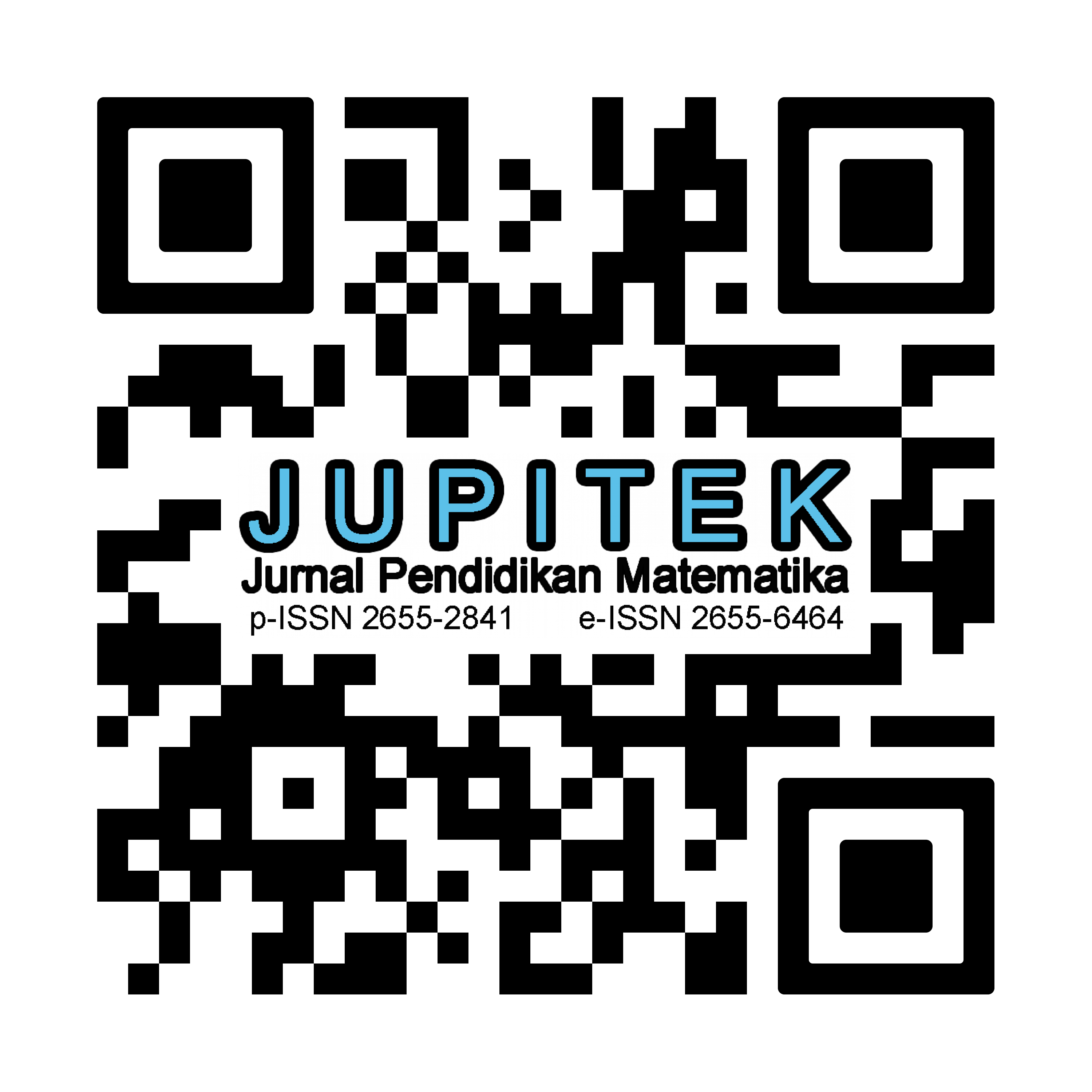UNDERSTANDING THE CONCEPT OF ALGEBRAIC FORM USING APOS THEORY IN TERMS OF PERSONALITY TYPE
Abstract
This research is based on descriptive research with a qualitative approach. The purpose of this study is to describe the understanding of the concept of algebraic form of junior high school students using APOS (Action, Process, Object, and Scheme) theory in terms of introverted and extroverted personality types. The instruments in this study are researchers (key instruments), personality type questionnaires, concept understanding tests and interviews (supporting instruments). Data collection techniques in this study using questionnaire, test and interview methods. The subjects in this study were one female student with introverted personality and one female student with extroverted personality. The results showed that the understanding of the concept of algebraic forms of introverted students based on APOS theory is at the action, process, object and scheme stages related to the concept of arithmetic operations of algebraic forms and is at the action stage related to the concept of solving contextual problems related to algebraic forms. While the understanding of the concept of algebraic form of extroverted students based on APOS theory is only at the action stage related to the concept of arithmetic operation of algebraic form and the concept of solving contextual problems related to algebraic form. Researchers hope that this research can be used as a consideration for teachers to pay more attention to the type of personality possessed by students, so that concepts can stick and reduce the occurrence of misunderstanding of concepts
Downloads
References
Agustina, N., & Nyimas Aisyah, dan. (2018). KEMAMPUAN PEMAHAMAN KONSEP SISWA SMP PADA MATERI PERSAMAAN GARIS LURUS BERBASIS APOS.
Annajmi. (2016). PENINGKATAN KEMAMPUAN PEMAHAMAN KONSEP MATEMATIK SISWA SMP MELALUI METODE PENEMUAN TERBIMBING BERBANTUAN SOFTWARE GEOGEBRA. MES (Journal of Mathematics Education and Science), 21(1), 1–9. http://journal.um-surabaya.ac.id/index.php/JKM/article/view/2203
Ansari, B. I. (2016). Komunikasi Matematik Strategi Berfikir dan Manajemen Belajar Konsep dan Aplikasi. Banda Aceh: PeNA.
Arini, Z., & Rosyidi, A. H. (2016). Profil Kemampuan Penalaran Siswa SMP Dalam Menyelesaikan Masalah Matematika Ditinjau Dari Tipe Kepribadian Extrovert Dan Introvert. MATHEdunesa Jurnal Ilmiah Pendidikan Matematika, 2(5), 127–136.
Arnon, I., Cottrill, J., & Dubinsky, E. (2014). APOS Theory.
Asiala, M., Brown, A., DeVries, D., Dubinsky, E., Mathews, D., & Thomas, K. (1996). A framework for research and curriculum development in undergraduate mathematics education. 1–32. https://doi.org/10.1090/cbmath/006/01
Atika Sari, A., & Kurniasari, I. (2022). PERBEDAAN KEMAMPUAN PEMECAHAN MASALAH MATEMATIKA SISWA PADA MATERI SPLTV DITINJAU DARI TIPE KEPRIBADIAN EKSTROVERT DAN INTROVERT.
A’yun, Q. (2021). Profil Pemahaman Konsep Siswa Smp Dalam Menyelesaikan Masalah Bangun Ruang Berdasarkan Tipe Kepribadian Introvert Dan Ekstrovert. Repo.Stkippgri-Bkl.Ac.Id. http://repo.stkippgri-bkl.ac.id/1290/
Bahrudin, E. R. (2019). Profil Pemahaman Konsep Siswa Kelas Vii Materi Bangun Datar Ditinjau Dari Tipe Kepribadian Ekstrovert Dan Introvert. EDU-MAT: Jurnal Pendidikan Matematika, 7(2), 168. https://doi.org/10.20527/edumat.v7i2.6408
Dubinsky, E. (2001). Using a Theory of Learning in College Mathematics Courses. MSOR Connections, 1(2), 10–15. https://doi.org/10.11120/msor.2001.01020010
Faridhatijannah, E., Untu, Z., Fendiyanto, P., Matematika, P., & Mulawarman, U. (2022). Kemampuan menyelesaikan soal cerita matematika pada siswa berkepribadian ekstrovert dan introvert (Vol. 13, Issue 2).
Hendriana, E. C., & Jacobus, A. (2017). Implementasi Pendidikan Karakter Di Sekolah Melalui Kegiatan Pembiasaan Dan Keteladanan. Tarbawi: Jurnal Keilmuan Manajemen Pendidikan, 3(02), 249. https://doi.org/10.32678/tarbawi.v3i02.1952
Herawati, E., & Kadarisma, G. (2021). Analisis Kesulitan Siswa SMP Kelas VII dalam Menyelesaikan Soal Operasi Aljabar. Jurnal Pembelajaran Matematika Inovatif, 4(2), 355–364. https://doi.org/10.22460/jpmi.v4i2.355-364
Jung, H. (2016). No Title. Personalwirtschaft. In Personalwirtschaft. De Gruyter Oldenbourg.
Kania, N., & Arifin, Z. (2020). Aplikasi Macromedia flash untuk Meningkatkan Pemahaman Konsep Matematika Siswa. JNPM (Jurnal Nasional Pendidikan Matematika), 4(1), 96. https://doi.org/10.33603/jnpm.v4i1.2872
Kartika, Y. (2018). Analisis kemampuan pemahaman konsep matematis peserta didik kelas vii smp pada materi bentuk aljabar. Jurnal Pendidikan Tambusai, 2(2), 777–785. https://doi.org/10.22460/jpmi.v4i4.875-882
Kiswanto. (2015). Deskripsi pemahaman konsep materi geometri ditinjau dari kepribadian. 38.
Lestari, A. A. (2021). Analisis Pemahaman Konsep Aljabar Mengacu pada Teori APOS Ditinjau dari Gaya Belajar Interpersonal. http://digilib.uinsby.ac.id/id/eprint/50851%0Ahttp://digilib.uinsby.ac.id/50851/1/Adela Ayu Lestari_D74217075.pdf
Liberna, H. (2018). Hubungan Gaya Belajar Visual dan Kecemasan Diri Terhadap Pemahaman Konsep Matematika Siswa Kelas X SMK Negeri 41 Jakarta. JNPM (Jurnal Nasional Pendidikan Matematika), 2(1), 98. https://doi.org/10.33603/jnpm.v2i1.988
Mulyani, A., Indah, E. K. N., & Satria, A. P. (2018). Analisis Kemampuan Pemahaman Matematis Siswa Smp Pada Materi Bentuk Aljabar. Mosharafa: Jurnal Pendidikan Matematika, 7(2), 251–262. https://doi.org/10.31980/mosharafa.v7i2.24
Mulyono, M. (2011). Teori Apos Dan Implementasinya Dalam Pembelajaran. Journal of Mathematics and Mathematics Education, 1(1). https://doi.org/10.20961/jmme.v1i1.9924
Nisa, W. K. (2020). PROFIL PEMAHAMAN KONSEP MATERI SEGIEMPAT MENURUT APOS DITINJAU DARI KEPRIBADIAN. In Profil pemahaman konsep materi segiempat menurut APOS ditinjau dari tipe kepribadian. http://digilib.uinsby.ac.id/45543/2/Wahyu Khoirun Nisa_D74216078.pdf
Pramesti, T. I., & Retnawati, H. (2019). Difficulties in learning algebra: An analysis of students’ errors. Journal of Physics: Conference Series, 1320(1). https://doi.org/10.1088/1742-6596/1320/1/012061
Purwanti, N. D., & Pujiastuti, H. (2020). Analisis kesulitan belajar aljabar ditinjau dari motivasi belajar siswa. Jurnal Analisa, 6(2), 122–131. https://doi.org/10.15575/ja.v6i2.8396
Puspita, I., & Masriyah. (2021). ANALISIS KESULITAN BELAJAR MATEMATIKA PADA MATERI ALJABAR KELAS VII SMP DARI PERBEDAN JENIS KELAMIN.
Rofiq, C. A., & Wijayanti, P. (2022). KEMAMPUAN PEMAHAMAN KONSEP MATEMATIKA SISWA TUNARUNGU PADA ALJABAR: UNSUR DAN OPERASI BENTUK ALJABAR. Jurnal Ilmiah Pendidikan Matematika, 10(1), 45–58. https://jurnalmahasiswa.unesa.ac.id/index.php/mathedunesa/article/view/25554/23429
Siska, M., Marzal, J., & Effendi, M. H. (2020). Profil Kemampuan Komunikasi Dan Pemahaman Matematis Siswa Berdasarkan Tipe Kepribadian Extrovert Dan Introvert. Delta: Jurnal Ilmiah Pendidikan Matematika, 8(2), 173. https://doi.org/10.31941/delta.v8i2.1056
Sugiarti, L. (2018). Kesulitan Siswa dalam Menyelesaikan Soal Operasi Bentuk Aljabar. Prosiding Seminar Nasional Pendidikan Matematika Etnomatnesia, 323–330.
Sugiyono, D. (2013). Metode Penelitian Kuantitatif, Kualitatif, dan Tindakan.
Wijayanti, A., Safitri, P. T., & Raditya, A. (2018). Analisis Pemahaman Konsep Limit Ditinjau Dari Gaya Belajar Interpersonal. Prima: Jurnal Pendidikan Matematika, 2(2), 157. https://doi.org/10.31000/prima.v2i2.714
Zuniana, E. R., & Rahaju, E. B. (2019). PEMECAHAN MASALAH ALJABAR SISWA SMP DITINJAU DARI TIPE KEPRIBADIAN. Jurnal Ilmiah Pendidikan Matematika, 8(2).

Copyright (c) 2023 Halimatus Sakdiyah, Janet Trineke Manoy

This work is licensed under a Creative Commons Attribution-NonCommercial-ShareAlike 4.0 International License.
License and Copyright Agreement
By submitting a manuscript to Jurnal Pendidikan Matematika (JUPITEK), the author(s) certify and agree to the following terms:
- Originality and Authority: The submitting author is authorized by all co-authors to enter into this agreement. The manuscript describes original work that has not been published previously in a peer-reviewed journal, nor is it under consideration for publication elsewhere.
- Approval: Its publication has been approved by all author(s) and by the responsible authorities of the institutions where the work was carried out.
- Rights: The authors secure the right to reproduce any material that has already been published or copyrighted elsewhere.
- Licensing and Copyright: Authors retain the copyright to their work.
- License Grant: The authors grant Jurnal Pendidikan Matematika (JUPITEK) the right of first publication, with the work simultaneously licensed under the Creative Commons Attribution-NonCommercial-ShareAlike 4.0 International (CC BY-NC-SA 4.0).
- Self-Archiving: Authors are permitted and encouraged to deposit the published version of their article in institutional repositories, on their personal websites, and other academic platforms, with proper acknowledgment of its initial publication in Jurnal Pendidikan Matematika (JUPITEK).





.png)


